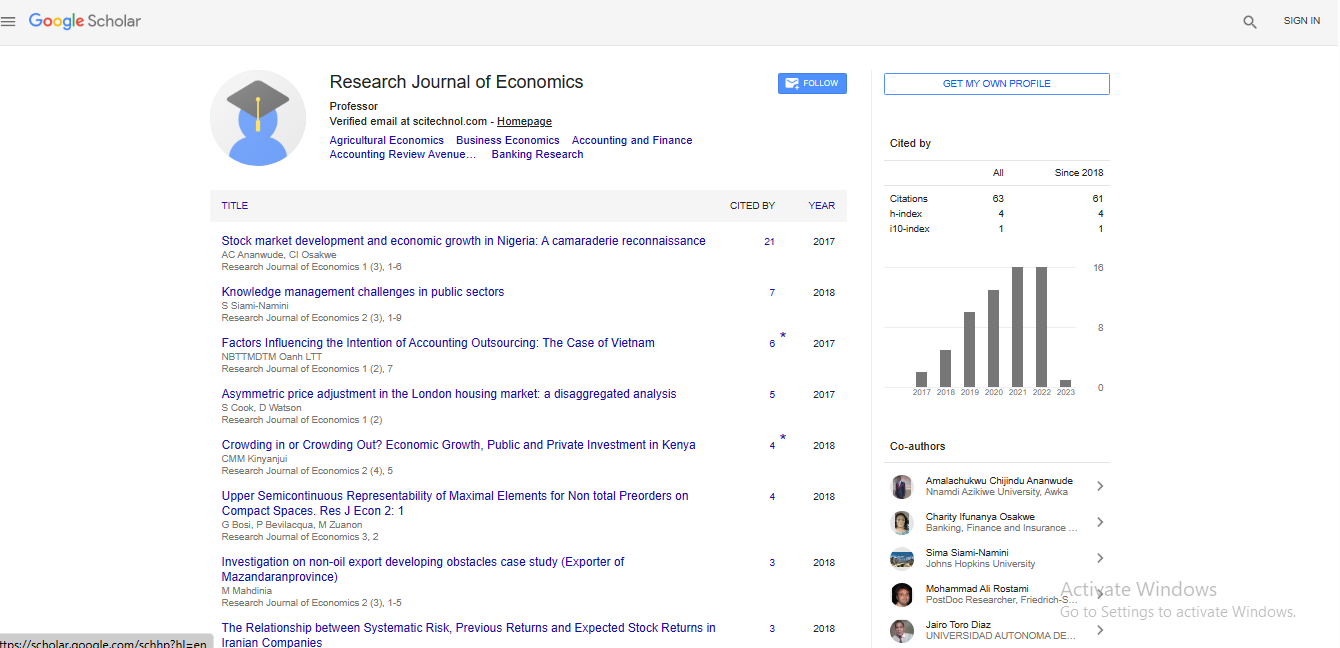Perspective, Res J Econ Vol: 7 Issue: 3
Essentiality of the Relationship between Education and Economic Development
Wanru Ren*
Department of Economics and Statistics, Hunan University, Changsha, China.
*Corresponding Author: Wanru Ren
Department of Economics and Statistics
Hunan University, Changsha, China
E-mail: ren@wan.cn
Received date: 28 April, 2023, Manuscript No. RJE-23-102388;
Editor assigned date: 02 May, 2023, PreQC No. RJE-23-102388 (PQ);
Reviewed date: 16 May, 2023, QC No. RJE-23-102388;
Revised date: 23 May, 2023, Manuscript No. RJE-23-102388 (R);
Published date: 30 May, 2023 DOI: 10.4172/RJE.1000154
Citation: Ren W (2023) Essentiality of the Relationship between Education and Economic Development. Res J Econ 7:3.
Description
Education has long been recognized as a critical factor in economic development and social progress. It plays a pivotal role in equipping individuals with the skills and knowledge necessary to participate in the workforce and contribute to economic growth. Education economics is a field of study that investigates the relationship between education and the economy, examining how investments in education impact economic outcomes at both the individual and societal levels. This study discusses the key concepts and findings of education economics, highlighting its significance in shaping the future of societies.
Educational economics
One of the fundamental concepts in education economics is the concept of human capital. Human capital refers to the skills, knowledge, and capabilities that individuals acquire through education and training. It is considered a form of investment, as individuals and societies allocate resources to education with the expectation of future economic returns. Human capital theory argues that individuals who possess higher levels of education and skills are more productive, earn higher wages, and contribute more to economic growth compared to those with lower levels of education.
Empirical evidence consistently supports the positive correlation between education and economic outcomes. Numerous studies have shown that higher levels of education are associated with higher individual earnings. For example, in many countries, individuals with a college degree tend to earn more than those with only a high school diploma. This wage premium is often referred to as the "education premium" and underscores the economic benefits of investing in education.
Moreover, education has a significant impact on labor market outcomes. As economies transition from labor-intensive industries to knowledge-based economies, the demand for highly skilled workers increases. By acquiring advanced skills and knowledge through education, individuals are better positioned to meet the demands of a changing labor market. This, in turn, contributes to overall productivity growth and economic development. Conversely, a lack of investment in education can lead to a skills gap, where the available workforce is ill-equipped to meet the demands of a modern economy, hindering economic progress.
Education economics also emphasizes the importance of educational quality and equity. While access to education is crucial, it is not sufficient on its own to drive economic development. The quality of education plays a vital role in determining its impact on economic outcomes. High-quality education equips individuals with the necessary skills and competencies to excel in the workforce and contribute to innovation and productivity. Therefore, investing in improving the quality of education is essential for maximizing its economic benefits.
Furthermore, ensuring equity in education is crucial for inclusive economic growth. Education should be accessible to all individuals, regardless of their socioeconomic background. Inequality in access to education can perpetuate socioeconomic disparities, hindering social mobility and exacerbating economic inequality. By investing in education and ensuring equal opportunities for all, societies can foster social cohesion and create an environment conducive to economic development.
Governments and policymakers play a pivotal role in shaping education economics. They are responsible for setting education policies, allocating resources, and creating an enabling environment for education to thrive. Education expenditure is a critical component of government budgets, reflecting the importance placed on education in national development strategies. Governments need to prioritize education spending, not only to provide adequate resources for educational institutions but also to support policies that promote quality and equity in education.
In addition to government investment, the private sector also has a role to play in education economics. Public-private sector partnerships and collaborations can help address funding gaps, enhance the quality of education, and bridge the skills gap by aligning educational curricula with industry needs. By working together, governments and the private sector can create a robust education ecosystem that fosters economic growth and prepares individuals for the workforce of the future.
Conclusion
Education economics provides valuable insights into the relationship between education and economic development. Investments in education have far-reaching economic benefits, enhancing individual earnings, labor market outcomes, and overall productivity. However, for education to maximize its potential, it is crucial to focus not only on access but also on educational quality and equity. Governments, policymakers, and the private sector must collaborate to create an enabling environment that supports high-quality education for all. By doing so, societies can control the power of education to drive inclusive economic growth and shape a prosperous future.
 Spanish
Spanish  Chinese
Chinese  Russian
Russian  German
German  French
French  Japanese
Japanese  Portuguese
Portuguese  Hindi
Hindi 